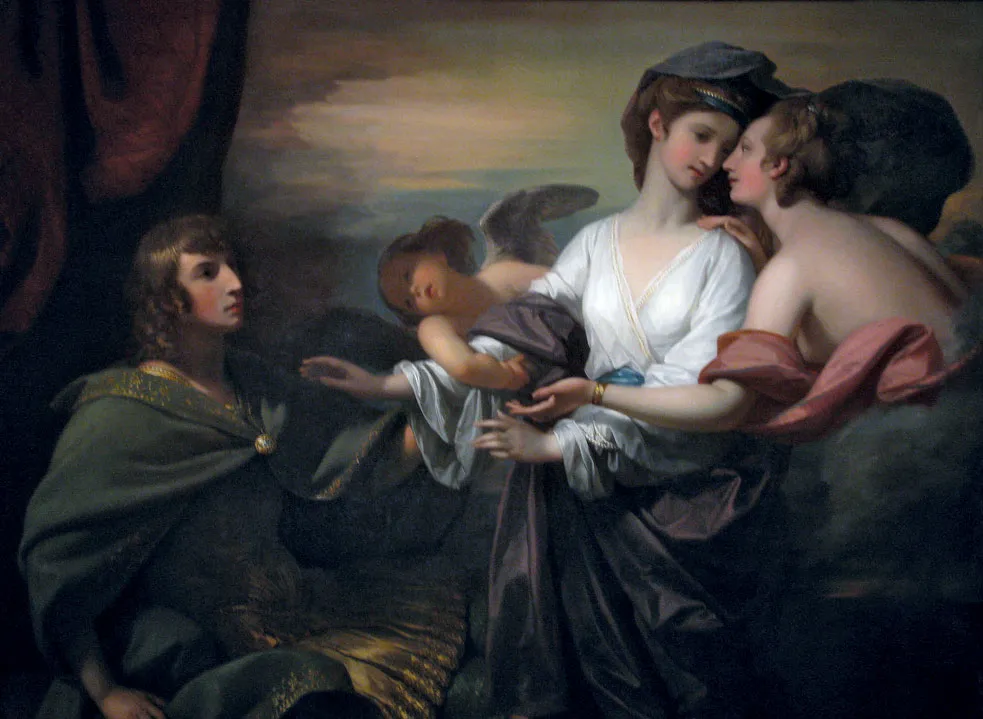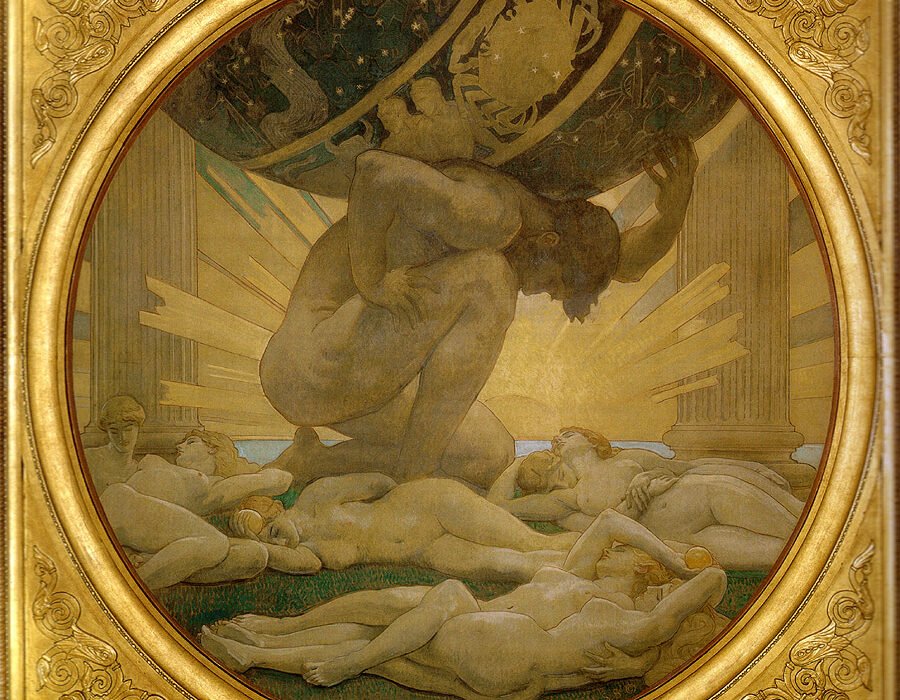Few love stories have burned as brightly—or as destructively—as that of Paris and Helen. Their romance is not just a tale of passion but one of fate, beauty, betrayal, and war. It is a story that has endured for thousands of years, told and retold through poetry, theater, painting, and modern interpretations. To speak of Paris and Helen is to step into the world of Greek mythology, where gods meddle in human lives, where desire and pride collide, and where the spark of love can ignite a decade-long war.
The story of Paris and Helen is not simply about two lovers. It is about how human choices intertwine with divine will, how beauty can become a curse, and how personal desire can reshape the destiny of nations. Their romance is remembered as the event that sparked the Trojan War, one of the most legendary conflicts in history and myth alike.
The Seeds of Destiny: A Wedding, a Goddess, and an Apple
Long before Paris laid eyes on Helen, their fates were entwined by a quarrel among the gods. The myth begins at the wedding of Peleus and Thetis, the parents of Achilles. Every god and goddess was invited—except Eris, the goddess of discord. Furious at being excluded, Eris crashed the celebration and hurled a golden apple inscribed with the words: “To the fairest.”
The apple immediately caused discord among three powerful goddesses: Hera, queen of the gods; Athena, goddess of wisdom and war; and Aphrodite, goddess of love and beauty. Each claimed the apple for herself. Unable to resolve the matter, they turned to Zeus, king of the gods, for judgment. But Zeus, unwilling to choose among the three, appointed a mortal prince to decide—the Trojan prince Paris.
Thus began the Judgment of Paris, one of mythology’s most pivotal moments. Each goddess attempted to sway him with promises. Hera offered political power and dominion over nations. Athena promised wisdom and victory in battle. But Aphrodite offered something more seductive: the love of the most beautiful woman in the world.
Paris, young and impressionable, chose Aphrodite. By doing so, he set in motion the events that would one day lead to the fall of his city.
Helen: The Face That Launched a Thousand Ships
The prize Aphrodite promised Paris was Helen of Sparta, the daughter of Zeus and Leda, and the most beautiful mortal woman on earth. From birth, Helen was marked by her beauty as both a gift and a curse. Men across Greece sought her hand in marriage, knowing that to win Helen was to win glory.
Her stepfather, King Tyndareus of Sparta, feared that choosing a husband for her would provoke deadly rivalries. To prevent conflict, the clever hero Odysseus suggested an oath: all suitors must swear to defend the chosen husband, no matter what. The oath was binding, and when Helen eventually married Menelaus, brother of Agamemnon, she became queen of Sparta under this fragile peace.
But Helen’s beauty was never fully hers to control. In myth, she embodies the idea that beauty can be both enchanting and destructive. She is remembered as “the face that launched a thousand ships,” a phrase coined later in literature but forever tied to her legend. Her story reminds us that desire, though intimate, can ripple outward until it reshapes the world.
Paris and Helen: A Meeting Written in the Stars
When Paris traveled to Sparta—accounts vary as to whether on a diplomatic mission or simply drawn there by destiny—he met Helen. According to the myths, Aphrodite ensured that Helen would fall in love with Paris, though whether this was true love or divine manipulation remains a subject of debate.
The sources differ on Helen’s role in the romance. Some say she was swept away against her will, abducted by Paris while Menelaus was away. Others insist she left willingly, enchanted by Paris’s charm, youth, and the promise of passion beyond her marriage. In either telling, her departure marked a betrayal that could not be ignored.
Together, Paris and Helen fled to Troy, a city of immense wealth and power on the coast of Asia Minor. Their union—whether seen as love or theft—was the spark that lit the fire of the Trojan War.
The Outrage of Menelaus and the Oath of the Greeks
When Menelaus discovered that his wife was gone, he invoked the oath sworn by all Helen’s former suitors. They had vowed to defend the honor of her chosen husband, and now the time had come to prove it. Across Greece, kings and warriors gathered to honor their pledge.
Under the leadership of Agamemnon, brother of Menelaus, a vast army was assembled. Among its ranks were legendary heroes: Odysseus, Ajax, Diomedes, and most famously, Achilles. With a fleet of a thousand ships, they set sail for Troy to retrieve Helen and restore Menelaus’s honor.
Thus, a personal betrayal became a national cause, and love transformed into war. The Greeks framed their mission as righteous vengeance, but beneath it lay deeper motives: glory, conquest, and the chance to prove themselves on the grandest stage of all.
The Trojan War: Love’s Consequences
The war that followed was immortalized by Homer in the Iliad and Odyssey, though these epics tell only fragments of the story. For ten years, Greeks and Trojans clashed in brutal combat. Heroes rose and fell. Gods took sides, interfering in battles, saving their favorites, and deepening the chaos.
Paris himself played a controversial role. Unlike Achilles or Hector, he was not a great warrior. He was often depicted as hesitant, even cowardly, preferring the safety of his bow to the clash of swords. His most famous moment came in a duel with Menelaus, where only divine intervention saved him from certain death.
Helen, meanwhile, became both a symbol and a scapegoat. Some sources portray her as wracked with guilt, longing for her old life in Sparta. Others suggest she remained loyal to Paris, even as Troy suffered around her. Her beauty continued to be both a blessing and a curse, revered and resented by those whose lives it had altered.
The war culminated not in battle but in trickery—the famous Trojan Horse, a ruse devised by Odysseus. The Greeks infiltrated the city, destroyed it from within, and brought Troy to its knees. Paris himself was eventually killed, and Helen’s fate took yet another turn.
The Return of Helen
What became of Helen after Troy’s fall is one of mythology’s most debated questions. In the most widely accepted version, she was reunited with Menelaus, who, despite everything, took her back. Some say he was still bewitched by her beauty, unable to resist. Others suggest that killing her would have dishonored him further, for she remained a daughter of Zeus.
Together, they returned to Sparta, where Helen resumed her role as queen. Yet the shadow of the war never left her. In some myths, she lived out her days in quiet dignity; in others, she was despised by her people, blamed for the countless lives lost. Still others imagined her ascended to the Isles of the Blessed, granted a place among the immortal heroes.
Her story does not end neatly, for it is not the tale of a perfect heroine but of a woman caught between love, fate, and the will of the gods.
Symbolism of Paris and Helen’s Romance
The tale of Paris and Helen is more than myth—it is a mirror of human truths. It asks questions that resonate even today:
- Is love a choice or a destiny?
- Can beauty be a gift if it brings destruction?
- Do personal desires outweigh communal responsibilities?
Paris represents desire untempered by wisdom, a man swayed by passion and promise rather than foresight. Helen embodies the duality of beauty—worshiped yet blamed, admired yet resented. Together, they symbolize how private decisions can ripple into public catastrophe.
Their story also reflects the ancient Greek worldview, where gods meddled in human affairs, fate could not be escaped, and the boundary between personal and political was fragile. In many ways, the Trojan War is not about military conquest but about the consequences of choices driven by love, lust, and pride.
Paris and Helen in Literature and Art
The love of Paris and Helen has inspired countless works across centuries. In Homer’s Iliad, Helen’s presence is haunting, her beauty both a cause of conflict and a point of reflection. Later playwrights, such as Euripides, offered more nuanced portrayals, with some versions even suggesting that a phantom Helen went to Troy while the real Helen remained in Egypt.
In modern times, poets, painters, and novelists have returned again and again to this story. Christopher Marlowe famously immortalized Helen as “the face that launched a thousand ships,” capturing both the admiration and the condemnation she inspired. Artists from Jacques-Louis David to Gustave Moreau painted scenes of Paris and Helen, often highlighting their passion while foreshadowing the destruction it would bring.
Even today, films, novels, and operas revisit their romance, proving its timeless power. The story endures because it is not only about war but about love’s ability to inspire both greatness and tragedy.
The Legacy of a Mythic Romance
The romance of Paris and Helen lives on not as a simple tale of love but as a meditation on human nature. It reminds us that love is not always gentle, that beauty can be dangerous, and that passion can reshape history.
Their story is woven into the cultural fabric of the West, influencing literature, art, and philosophy for millennia. It endures because it is not merely about gods and heroes but about the timeless struggles of desire, choice, and consequence.
Paris and Helen teach us that love is never isolated. It binds, it burns, and it transforms not only the lovers but all who are drawn into its orbit. In their union, we see the potential for ecstasy and destruction, for tenderness and ruin.
And so, even thousands of years later, their romance continues to fascinate us—not as a distant myth but as a story that reflects the deepest truths of what it means to be human.






